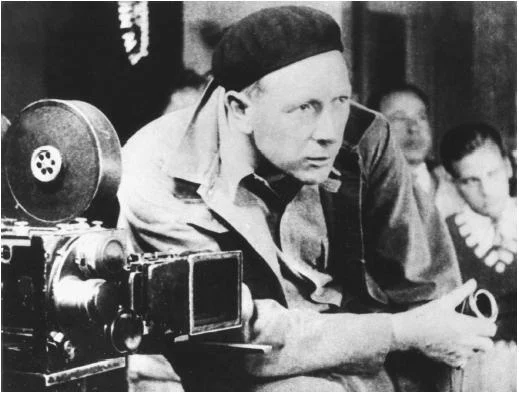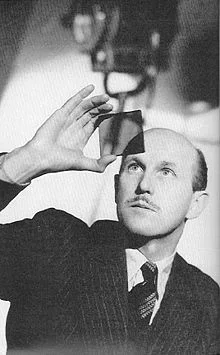Greetings Movie Advocate regulars! Today we kick off our special Christmas present to you, a series of 12 lists for the 12 Days of Christmas. We're beginning with the list of our 12 favorite directors. Agree? Disagree? Either way we'd love to hear about it!
Justin's List:
12. Ingmar Bergman - The 7th Seal, The Hour of The Wolf, Persona

I've been a big fan of Bergman's style since I became acquainted through The 7th Seal. His use of his native Sweden is a good match for his cold black and white cinematography. Bergman is equally at home with fantasy as he is with smaller introspective dramas.
11. Jean-Luc Godard - Breathless, Band of Outsiders, A Woman is a Woman

Godard is an experimental visionary who's not afraid to poke fun at the conventions of film. Breathless is as shocking and exciting today as it was when it was released in the 60's.
10. Satoshi Kon - Paprika, Paranoia Agent, Tokyo Blue

This year we lost Satoshi Kon who made some of the finest anime films ever. He elevated the medium to include adult themes and subject matter that was couched in magical realism.
9. Seijun Suzuki - Tokyo Drifter, Branded to Kill, Detective Bureau 2-3: Go to Hell Bastards!

An experimental Japanese director with a penchant for crime movies. His visual palette is incomparable. The outrageous characters in his movies mirror his idyosynchratic film-making decisions.
8. Henri-Georges Cluzot - The Wages of Fear, Le Corbeau, Diabolique

Often called the French Hitchcock, Cluzot can weave the suspense like no other director can. The Wages of Fear is so tense it makes There Will Be Blood look like Office Space.
7. Dario Argento - Suspiria, Phenomena, Deep Red

Consistently my favorite horror director. The perfect marriage of artistic virtuosity and borderline anti-social personality disorder.
6. Wes Anderson - Rushmore, The Life Aquatic, The Fantastic Mr. Fox

Some people think it's cool to distance them self from Wes Anderson. They're wrong. He's great.
5. Sergio Leone - The Good, The Bad, and The Ugly, Once Upon a Time in the Old West, For a Few Dollars More

The word is verisimilitude. It is the fancy aesthetic word meaning truthiness. That's what you get with Leone, a compelling movie world that's exciting and captivating that feels real while you inhabit it. Of course, that world could never exist.
4. John Huston - The African Queen, The Maltese Falcon, The Treasure of the Sierra Madre

Huston was the original tough guy director and the closest thing film has to an Ernest Hemingway. He tells stories about doomed men in rotten situations and he does it damned well.
3. Stanley Kubrick - A Clockwork Orange, 2001: A Space Odyssey, Paths of Glory

No other director was as consistently amazing and groundbreaking as Kubrick. The proof is on screen. For better or worse, he influenced nearly everyone who came after him.
2. Jean Renoir - The Rules of the Game, The River, The Grand Illusion

Renoir had the amazing ability to capture magic in everyday life. His movies consistently lull me into a false sense of comfort before he pushes everything into the slightly fantastical.
1. Martin Scorsese - Taxi Driver, Goodfellas, The Departed

No other director has given me as much enjoyment as Scorcese. Even his lesser movies are amazing. Even if you're not interested at all in the story, watching how everything comes together and how all the different technical pieces work is, for me, more enjoyable than 90% of what comes to theaters.
Ben's List:
12. Quentin Tarantino - Jackie Brown, Inglourious Basterds, Death Proof

Yeah, I’m gonna be that guy. Tarantino is probably a kitchy choice to kick off my favorite directors list with. In my defense, however, I can’t think of a single second of movie that Tarantino has directed that I haven’t loved with all my heart. His shift to more fantastical, homage-heavy fare in the 2000s, while perhaps not the lightning bolt of his early 90s work, has produced some of the most memorable images and moments in contemporary movie history.
11. Terrence Malick - Days of Heaven, Badlands, The Thin Red Line

I really have no business putting Terrence Malick on my best directors list. I’ve only managed to see two of his not-very-imposing four movies so far. I am very new to the Malick game, so I’m trying to spread his movies out a little bit. However, it’s a testament to his work that after seeing only two of his movies I have little doubt that he will always occupy a spot on my favorite directors list. Though their plots lend them the feel of classic novels, Badlands and especially Days of Heaven embrace the characteristics of film that could not be achieved in any other medium. Location, sunlight, clouds, weather, landscape, seasons. When you see how easy Malick makes it look, you’ll wonder that more directors and cinematographers don’t explore these exclusively cinematic revelations in their own work.
10. Michael Curtiz - The Adventures of Robin Hood, Casablanca

I saw over a dozen of Michael Curtiz’s movies before I recognized that the same name was listed as the director credit on all of my favorite Hollywood movies from the 30s. Michael Curtiz isn’t the household name that Ford, Huston, and Hawks have become, but can you name any other director who commanded so many amazing movies? Captain Blood, The Adventures of Robin Hood, Angels with Dirty Faces, The Sea Hawk, and of course Casablanca. He’s an almost invisible figure in Hollywood history, but he’s the man responsible for a good handful of my favorite movies.
9. Paul Verhoeven - Total Recall, Black Book, Robocop, Starship Troopers, Showgirls

Verhoeven’s movies are a mad fever dream distortion of Hollywood. Sex and violence times 20. What Nic Cage is to mega-acting, Paul Verhoeven is to mega-directing.
8. Billy Wilder - One Two Three, Some Like It Hot, The Apartment

I think 5 years ago, Billy Wilder would have been higher on my list. I went through a huge Wilder phase. And for good reason! The razor sharp dialogue crafted with co-writer I.A.L. Diamond, the air tight control of zany insanity, the Midas touch for directing actors. Recently, I don’t find myself revisiting his more saccharine productions like The Apartment and Sabrina nearly as often. On the other hand, I enjoy Wilder’s broad comedies (One Two Three, Some Like It Hot) more than ever, and there are some buried prizes in his dramatic repertoire as well.
7. Roman Polanski - Chinatown, The Fearless Vampire Killers, Rosemary's Baby

Ouch, I have a feeling I may get some heat for this one. I have close friends who refuse to watch Polanski movies on principle. His actions are deplorable, and his persona is pervy to this day. But goddamn it, he is a great goddamn director. For a more thorough exploration of what it means to disapprove of child rape, but still appreciate Polanski’s movies, please read the end of my Ghost Writer review here. Polanski works in familiar genres – horror, comedy, noir, espionage thriller – but his movies are skillfully abstracted from standards and tropes. Polanski’s movies exist in an insulated, paranoid reality, like Woody Allen but without the jokes and warmth. When people discuss the new wave of great directors in the cinema of the 60s and 70s - Malick, Penn, Coppola, Scorsese, Friedkin – Polanski is often wrongfully overlooked.
6. F.W. Murnau - Sunrise, Faust, Nosferatu

Sure he invented (found?) the most frightening vampire in the history of cinema with Nosferatu. But I love a handful of his other movies even more. Sunrise, Faust, and The Last Laugh show off a visual imagination virtually unparalleled in the history of cinema.
5. James Whale - Frankenstein, Bride of Frankenstein, The Invisible Man

Here’s to the fabulous, flamboyant James Whale, and his brave new world of gods and monsters.
4. Alfred Hitchcock - The 39 Steps, To Catch A Thief, Notorious

For paranoid neurotics like me, the fact that Hitchcock is one of us is little consolation. Hitchcock’s movies remind me that cops are out to get me, secret spies are out to get me, beautiful women are out to get me, and my own psyche is trying to attack me from within. But it’s a fun ride.
3. David Lean - Lawrence of Arabia, Brief Encounter, Oliver Twist

David Lean deserves two spots on this list: he essentially had two careers in the movies, one as a director of small, moody, postwar British melodramas like Brief Encounter and Oliver Twist, the other as the maestro of sweeping, expansive, colorful epics like Lawrence of Arabia and Doctor Zhivago. Either of those two halves of his career produced some of the best movies in the history of cinema, and the fact that they are the work of one man is just icing on the cake.
2. Howard Hawks - Gentlemen Prefer Blondes, Ball of Fire, Only Angels Have Wings

Nobody understood people like Howard Hawks. Even in his most seemingly uptight movies (cough Sgt. York cough), Hawks’ characters are motivated by the primal urges of sex, booze, and pride. However, there’s no cynicism in Hawks’ view of humanity. We’re a rascally bunch, us humans, but we’re lovable rascals. Some people might point to John Ford as the quintessential Old Hollywood director, but for my money, Howard Hawks directed smarter, more entertaining, and more consistent movies. It doesn’t hurt that he directed two of the cornerstones of Hollywood queer subversion, Gentlemen Prefer Blondes and Rio Bravo.
1. Michael Powell - A Matter of Life and Death, The Red Shoes

Contrary to the whole idea of a Best Directors list, Michael Powell taught me that the best directors are only great because they surround themselves with the best people. Powell understood movies fundamentally as a collaborative art, and his body of work stands as the best evidence available to dispute “auteur theory.” Powell’s collaborators were amongst the best ever to work in the movies: screenwriter Emerich Pressburger, David Lean (who started out as Powell’s editor), cinematographer Jack Cardiff, and actors Anton Walbrook, Marius Goring, Lawrence Olivier, Deborah Kerr, Sabu, and Roger Livesey. Powell interned with Alfred Hitchcock and in turn became a mentor to Martin Scorsese. He gave Helen Mirren her first staring role. He made movies for the masses that were also fiercely intelligent. If you want a clear, material understanding of the Allied zeitgeist during World War II, look no further than Powell’s movies. Virtually everything Powell touched turned to gold, but it’s hard work and good collaborators, not magic and mystery, that earn Powell my vote for best director of all time.